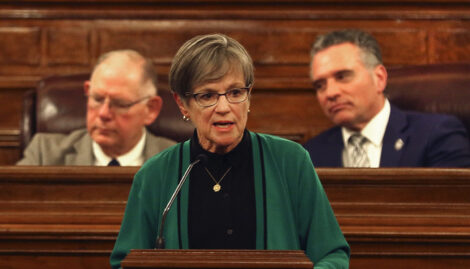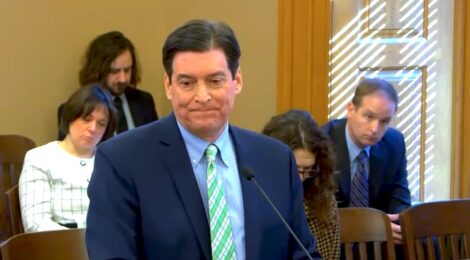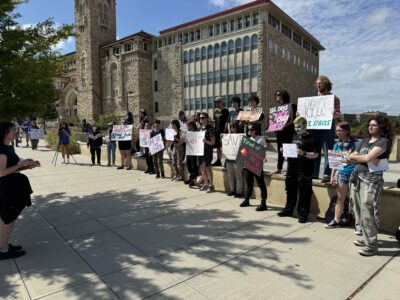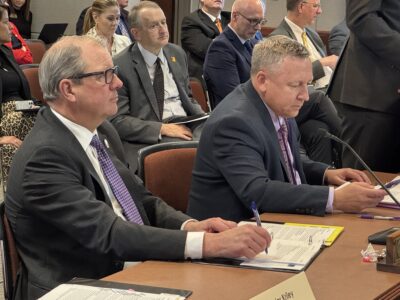To make Gateway district work, KU seeking to transfer ownership of some land to KU Endowment
Remaining stadium improvement to cost $177M, plus parking costs
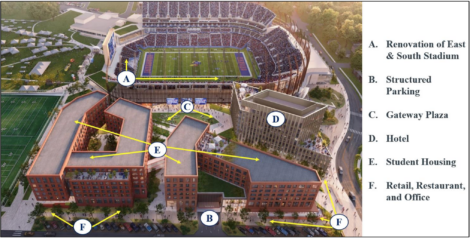
photo by: University of Kansas
A concept of KU's Gateway District, as provided to the Lawrence City Commission for review.
The price of progress regarding the University of Kansas’ Gateway project technically will include KU giving up ownership of a key piece of land near its football stadium.
KU officials this week are seeking approval to transfer ownership of nearly five acres of property immediately east of the stadium to the KU Endowment Association. Transferring ownership of the property — which includes the main parking lot for the stadium — is a major step in allowing private developers to construct a hotel, student housing and other such amenities on the site. The land that houses the stadium itself will remain owned by KU.
A KU leader also told the Journal-World the ownership transfer is needed to ensure the property goes on the community’s tax rolls.
“Those are steps you have to do to make it taxable,” Jeff DeWitt, KU’s chief financial officer, said in a recent interview.
KU is in the midst of negotiating an agreement for a group led by Edgemoor Infrastructure & Real Estate to build an approximately 150-room hotel and about 400 units of student housing on the property directly east of David Booth Kansas Memorial Stadium. It is contemplated that both the hotel and the student housing would be operated by private entities, making them for-profit ventures subject to property tax.
Indeed, KU is counting on the projects to generate about $19.5 million in new property tax revenue during the next couple of decades. A tax increment financing district will allow KU to use $5 million of that new property tax revenue to help pay for infrastructure costs associated with the renovation of the football stadium. The City of Lawrence will get the remaining $14.5 million to improve stormwater systems in the neighborhood adjacent to the stadium.
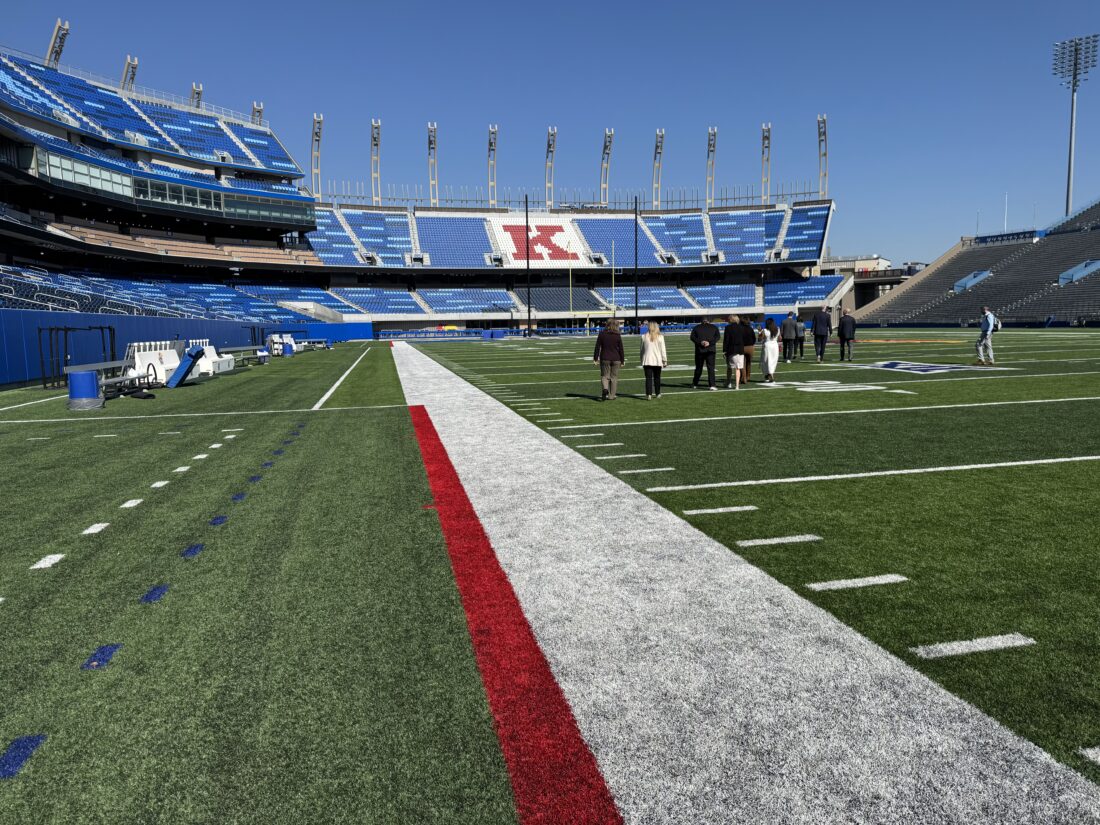
photo by: Chad Lawhorn/Journal-World
Members of the Kansas Board of Regents walk the field at David Booth Kansas Memorial Stadium on Oct. 16, 2025.
The Kansas Board of Regents will consider approving the change in ownership at its meeting on Wednesday.
Regents on Wednesday also are expected to give a key administrative approval that will allow demolition work on the east side of the football stadium to begin next month. As the Journal-World recently reported, demolition of the east grandstand is scheduled to take place in the middle of December. KU hopes to have the lower bowl of the east side open to seating by the 2026 football season, and the upper bowl open for the 2027 season.
Before any of that work can begin, the Regents must approve an “architectural program statement” for the project. The program statement doesn’t include specific designs or renderings of the east side improvements, but largely confirms details that university officials had previously shared with the Journal-World.
Those include that the east grandstands will move closer to the field, and have a steeper slope to them than the existing east grandstand. In that regard, the east grandstand will match the new seating areas on the west side of the stadium.
The statement also declares that the east side of the stadium will include “enhanced premium amenities,” and specifically mentioned enhanced “concessions, restrooms, social interaction zones, plazas, ticketing, concourses,” among other items.
The social interaction zones are likely a reference to the types of bar-like clubs where ticket-holders can mill around and watch the game while having access to special food and drink menus. The west and north sections of the revamped stadium have several of those areas, and KU leaders have reported they’ve been a success with ticket buyers this season.
DeWitt has told the Journal-World that current plans also call for a game day club to be located in the hotel that the developers will build on the northeast corner of the stadium, which also puts it adjacent to KU’s new conference center.
“It would be very, very integrated,” DeWitt said of how the hotel would become an additional spot for game day amenities.
However, none of the plans up for approval on Wednesday include the hotel, the student housing or a large outdoor entertainment plaza that would be located east of the stadium. Those components would come after the stadium construction is completed in 2027. KU has signed a development agreement with the city that says the entire Gateway project will be completed by the end of 2028.
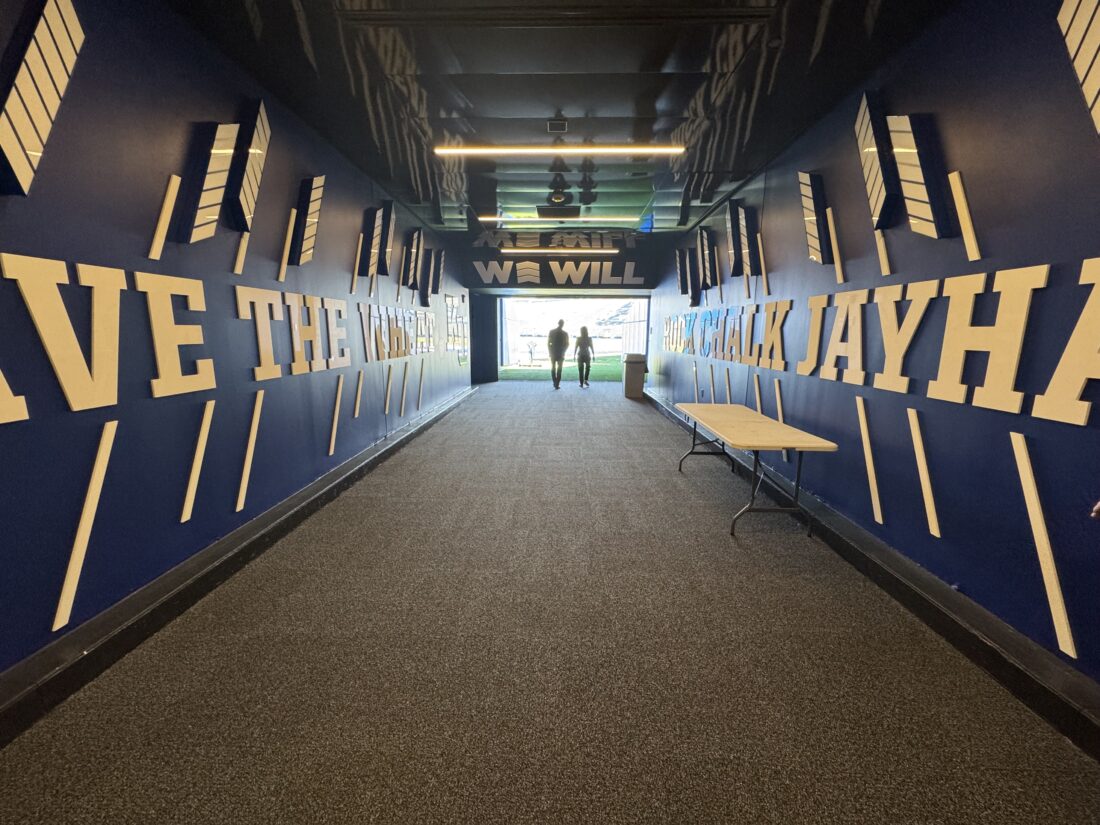
photo by: Chad Lawhorn/Journal-World
The tunnel leading to the field of David Booth Kansas Memorial Stadium is pictured on Oct. 16, 2025.
The document up for approval on Wednesday does set an estimated price for the construction of the east side of the stadium: $177 million. However, as construction on the west side of the stadium proved, the price is subject to change. Construction inflation caused the west work to increase by more than $100 million.
KU and its development partners are certainly hoping that won’t be the case on the east side. KU and its partners already are facing a significant number of additional costs above what it costs to build the east grandstands.
The development agreement with the city estimated $46 million in costs to build parking garages and lots to help the university meet its goal of providing 1,000 parking spots at or around the stadium. The parking garages basically would be on the first and second floors of the student housing buildings that would be constructed on the east side of the stadium. Those garages aren’t in this first phase of construction, and likely would not be complete until 2028.
According to the figures in the development agreement, developers are expected to pay for $126 million in construction to build the hotel and student housing components. All told, the stadium, hotel, student housing and other amenities on the east side are expected to cost more than $345 million. That’s in addition to $448 million of construction on the west side and north end of the stadium. The total project easily could finish with a price tag of more than $800 million.
Currently, KU officials are focusing on how they will pay for the $177 million needed to complete the east side of the stadium. The project is scheduled to receive $94.6 million of special tax incentive dollars that will be funded by new sales taxes and property taxes generated by the project.
The development agreement with the city estimates that a little more than $30 million of those incentives will be used for the east stadium improvements, with much of the remaining incentives slated to be used for parking projects.
The program documents submitted to the Regents don’t spell out how KU plans to pay for the east stadium improvements, other than to say it will be a mix of the tax incentive money, and private fundraising.
KU, however, has not announced how much money it must still raise to complete the east side of the stadium. KU has announced a major $300 million donation from alumnus David Booth. The first $75 million of that donation has been earmarked for stadium construction. Assuming that all of that $75 million will be applied to the east stadium improvements, that amount plus the tax incentives would provide KU with about $105 million of the $177 million needed for the east stadium improvements.
KU officials already have secured more than $150 million in pledges for the west stadium improvements, which are now complete. But KU leaders have acknowledged that they will be conducting new fundraising to complete the east renovations.
“We’re still out raising funds and will continue to be out raising funds to to finish off the project,” KU Chancellor Douglas Girod told a crowd of several hundred that gathered last week for the grand opening of the 55,000-square-foot-conference center that is located in the north end of the stadium.
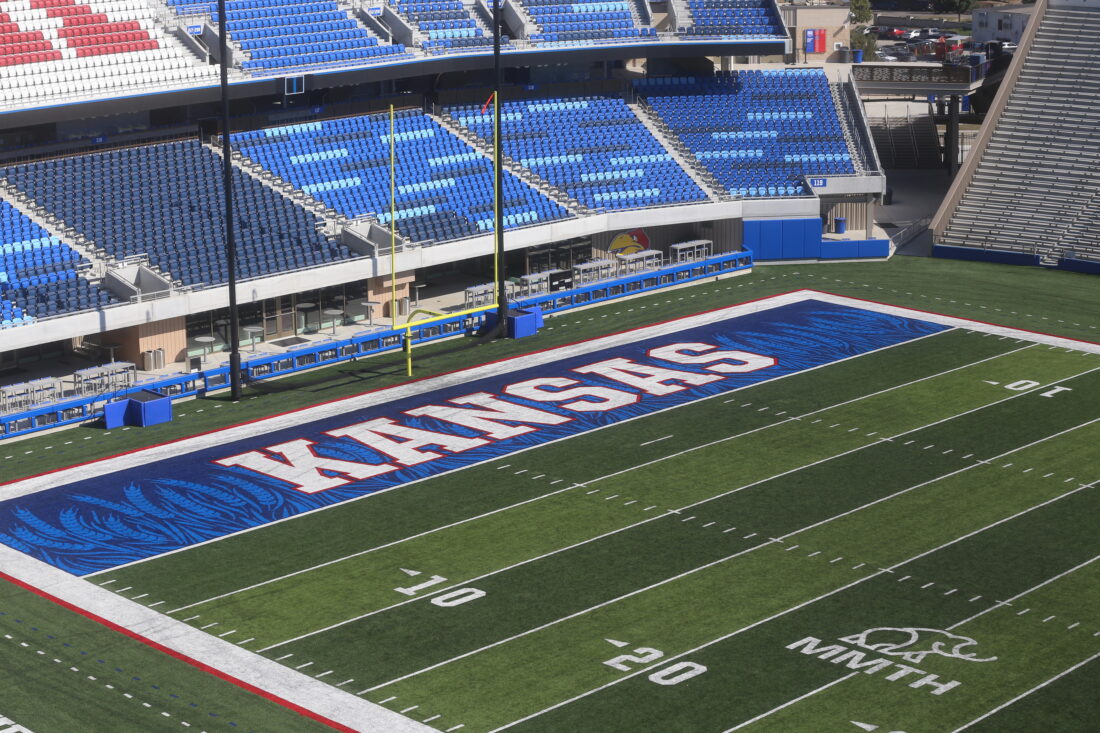
photo by: Chad Lawhorn/Journal-World
The north end of David Booth Kansas Memorial Stadium, which includes a new conference center, is pictured on Oct. 16, 2025.


